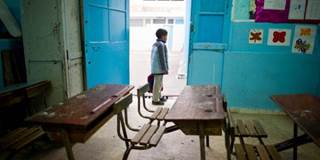Closing the Middle East’s Education Deficit
According to the UN, ongoing conflicts in the Middle East and North Africa are depriving more than 13 million children of an education, while the youth unemployment rate is the highest in the world. Governments and international institutions need to recognize that the problem is no longer a mere "development" issue.
NILE DELTA – About 60 miles north of Cairo’s Tahrir Square – the epicenter of the Egyptian uprising in 2011 – there is a secondary school students call “the prison.” A deformed box of concrete packed with dilapidated classrooms, the school is pockmarked with age and neglect. One teacher in the sleepy Nile Delta village morbidly quips that it doubles as a morgue. “We never saw a revolution here,” he said a few months ago, withholding his name for fear of losing his job. “A lot of the hope we had is now dead…it was killed.”



NILE DELTA – About 60 miles north of Cairo’s Tahrir Square – the epicenter of the Egyptian uprising in 2011 – there is a secondary school students call “the prison.” A deformed box of concrete packed with dilapidated classrooms, the school is pockmarked with age and neglect. One teacher in the sleepy Nile Delta village morbidly quips that it doubles as a morgue. “We never saw a revolution here,” he said a few months ago, withholding his name for fear of losing his job. “A lot of the hope we had is now dead…it was killed.”